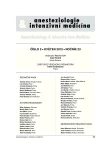-
Medical journals
- Career
A severe course of acquired haemophilia A – case report
Authors: M. Chobola; V. Šrámek; J. Hruda
Authors‘ workplace: Anesteziologicko-resuscitační klinika, FN u sv. Anny v Brně, Lékařská fakulta Masarykovy Univerzity Brno
Published in: Anest. intenziv. Med., 23, 2012, č. 2, s. 97-100
Category: Intesive Care Medicine - Case Report
Overview
Circulating anticoagulants are endogenous substances interfering in the coagulation cascade, which may even lead to severe bleeding. In the vast majority of cases, these substances are immunoglobulins, production of which may be induced by the administration of coagulation factor concentrates, e. g. in haemophilia patients. However, they can also be associated with malignant neoplasms, drug interactions and old age. The authors present a case report of an 84-years-old female patient in whom factor VII inhibitor was detected following urological surgery. Although diagnostic tests for anticoagulants were negative prior to surgery, the patient developed coagulation inhibitors afterwards – most probably due to numerous blood transfusions. The patient died on the 5th day in spite of early detection of anticoagulant production and subsequent complex therapy.
Keywords:
case report – coagulation – circulating anticoagulant – factor VIII inhibitor
Sources
1. Shander, A., Walsh, C. E., Cromwell, C. Acquired hemophilia: a rare but life - threatening potential cause of bleeding in the intensive care unit. Intensive Care Med., 2011, 37, p. 1240–1249.
2. Shetty, S., Bhave, M., Ghosh, K. Acquired hemophilia A: Diagnosis, aetiology, clinical spectrum and treatment options. Autoimmunity Reviews, 2011, 10, p. 311–316.
3. Buliková, A., Smejkal, P., Zavřelová, J., Chlupová, G., Penka, M. Získané inhibitory krevního srážení. Interní Med., 2008, 10, 7 a 8, p. 336–339.
4. Collins, P. W., Hirsh, S., Baglin, T. P. et al. Acquired hemophilia A in the United Kingdom a 2-year national surveillance study by the United Kingdom Hemophilia Centre Doctor’s Organisation. Blood, 2007, 109, p. 1870–1877.
5. Ma, A. D., Carrizosa, D. Acquired factor VIII inhibitors: pathophysiology and treatment. Hematology, (Am Soc Hematol Educ Program) 2006, p. 432–437.
6. Lak, M., Sharifian, R. A., Karimi, K., Mansouritorghabeh, H. Acquired hemophilia A: clinical features, surgery and treatment of 34 cases, and experience of using recombinant factor VIIa. Clin. Appl. Thromb. Hemost., 2010, 16. p. 294–300.
7. Sallah, S. Treatment of acquired hemophilia with factor eight inhibitor bypassing activity. Haemophilia, 2004, 10, p. 169–73.
8. Cattaneo, M. Review of clinical experience of desmopressin in patients with congenital and acquired bleeding disorders. Eur. J. Anaesthesiol., 1997, 14, p. 10–14.
9. Abshire, T., Kenet, G. Recombinant factor VIIa: review of efficacy, dosing regimens and safety in patients with congenital and acquired factor FVIII or IX inhibitors. J. Thromb. Haemost., 2004, 2, p. 899–909.
10. Collins, P. W. Treatment of acquired hemophilia A. J. Thromb. Haemost., 2007, 5, p. 893–900.
11. Gandini, G., Franchini, M., Manzato, F., Lippi, G., Aprili, G. A combination of prednisone, high-dose intravenous immunoglobulin and desmopressin in the treatment of acquired hemophilia A with high-titer inhibitor. Haematologica, 1999, 84, p. 1054.
12. Hay, CH. R. M., Collins, P. W., Keeling, D. M., Liesner, R. The diagnostics and management of factor VIII and IX inhibitors: a guideline from the United Kingdom Haemophilia Centre Doctors Organisation. Br. J. Haematol., 2006, 133, p. 591–605.
13. Franchini, M., Veneri, D., Lippi, G., Stenner, R. The efficacy of rituximab in the treatment of inhibitor-associated haemostatic disorders. Thromb. Haemost., 2006, 96, p. 119–125.
14. Zeitler, H., Ulrich-Merzenich, G., Hess, L. et al. Treatment of acquired haemophilia by the Bonn-Malmö protocol: documentation of an in vivo immunomodulation concept. Blood, 2005, 105, p. 2287–2293.
Labels
Anaesthesiology, Resuscitation and Inten Intensive Care Medicine Surgery Internal medicine Cardiology Clinical oncology Trauma surgery Laboratory
Article was published inAnaesthesiology and Intensive Care Medicine

2012 Issue 2-
All articles in this issue
- The course of cytokine response in an animal model of intraabdominal sepsis modified by immunosuppression
- A severe course of acquired haemophilia A – case report
- Validation of factors predicting difficult intubation
- Quality of life one year after discharge from the ICU
- Trefoil factor 1 as an indicator of damage of the intestinal mucosa during sepsis in children
- An audit of the i-gel supraglottic airway for general anaesthesia with spontaneous and controlled ventilation – the effect of ventilation mode and operator experience on device performance
- Anaesthesiology and Intensive Care Medicine
- Journal archive
- Current issue
- Online only
- About the journal
Most read in this issue- Validation of factors predicting difficult intubation
- Quality of life one year after discharge from the ICU
- A severe course of acquired haemophilia A – case report
- An audit of the i-gel supraglottic airway for general anaesthesia with spontaneous and controlled ventilation – the effect of ventilation mode and operator experience on device performance
Login#ADS_BOTTOM_SCRIPTS#Forgotten passwordEnter the email address that you registered with. We will send you instructions on how to set a new password.
- Career

